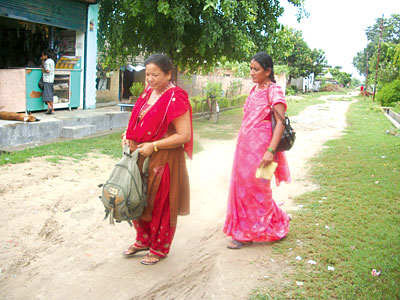 SRIJANA ACHARYA UNITED BY LOSS: The husbands of Laxmi Devi Khadka and Devisara Wali were disappeared by opposing sides during the war, but they now work together in Bardiya to help the families of other people who are still missing. |
Their husbands were taken from them by opposing sides during the conflict, but they journey in pain together Laxmi Devi Khadka's husband, Dil Bahadur, was disappeared by the Maoists in 2003. Devisara Wali's husband, Suresh, was last seen in the district police office in Bardiya eight years ago.
Under normal circumstances, Laxmi and Devisara would hardly be able to get along. But the two are not just friends, they work together as activists campaigning on behalf of the families of the disappeareds.
"We may have been victimised by different groups but the pain is still the same," Devisara says, recalling how her husband and father-in-law were both detained by the police. Her father-in-law was released four days later, but Suresh was never heard from again.
Laxmi recalls her own ordeal in a monotone drained of all emotion. "It was dark when the Maoists came and took my husband away," she says. "They said they would send him back in 15 minutes, but we never saw him again."
Of all the districts in Nepal, Bardiya recorded the largest number of disappeareds during the war. Nearly five years after the end of the conflict, Dil Bahadur Khadka and Suresh Wali are among the 172 people still listed as missing from Bardiya.
Over the years, the search for their husbands has brought Laxmi and Devisara close together, and the two now work as a team to help other families of the disappeared. Along with 200 other men and women, they have been advocating for the rights of war victims and families of the disappeared under the Committee for Conflict Affected People in Bardiya.
Laxmi has gone to every Maoist leader, political party, and human rights group in her district. Padam Rijal 'Navin', the known Maoist kidnapper of Laxmi's husband, threatened to bomb her house and take away her son too, if she continued the search.
Laxmi says she never had big dreams, all she ever wanted was to live in peace. "I can't believe he is dead until I see his body," she says. "I keep searching for his face in the crowd. At night when the dogs bark, I still get up to see if it's him."
Devisara still keeps all her husband's clothes and belongings in the hope that he will return one day. "Every time I see a new number calling my mobile, I think it might be him," she says.
Both their families are entitled to compensation, but it has taken years for them to get Rs 100,000 from the government. Raising children has been difficult for both families. Laxmi's son was 10 when his father went missing, and is now not eligible for free education. Devisara's two daughters could not get government scholarships because they had also crossed the age limit.
Both families are also in a legal limbo. Devisara's daughters don't have citizenship certificates because of the absence of the father the state itself disappeared. Laxmi's children got citizenship papers only after much pressure from human rights groups.
The women also face problems in claiming their husbands' share of family property. Devisara's in-laws have refused to give anything either to her or her daughters. They live in a separate section of the same house.
"No amount of compensation will make up for our� loss, but we are at least entitled to know where our husbands are," Devisara says. Two weeks after Dil Bahadur disappeared, a local paper in Nepalganj reported that he had been executed. But Laxmi never got any official confirmation.
Laxmi and Devisara have waited for the sake of the children, but their patience is running out. Laxmi's younger son constantly talks about killing the man responsible for his father's disappearance, whom he sees walking around freely in the village every day.
Says Devisara: "Those who took away our husbands are walking free and they are threatening to kill us if we search for answers."
READ ALSO:
Searching for answers
The disappeared and the disquiet of those left behind, ROBERT GODDEN


